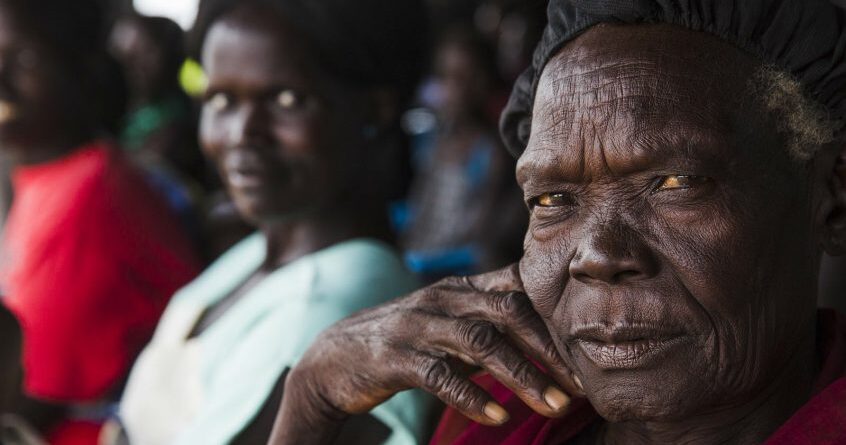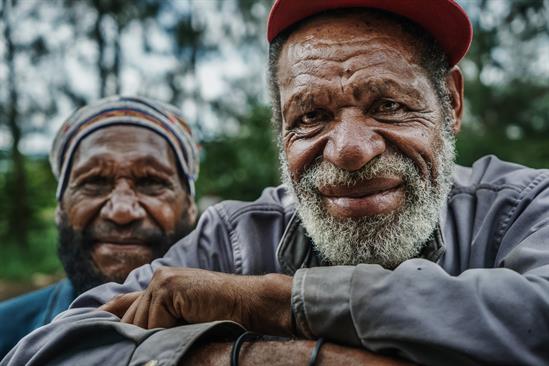Dear Beamers,
Greetings!
The rising population of older adults has exerted profound influence on the political, economic, and social dynamics of societies across both industrialized and developing regions. Mirroring trends observed in many sub-Saharan African nations, Nigeria is experiencing a notable surge in its elderly demographic. This week’s newsletter will explore the specific needs and challenges faced by Nigeria’s aging population.
The demographic shift towards an aging population is an undeniable reality across Nigeria. Regrettably, the country lacks infrastructure and initiatives conducive to an age-friendly environment. In Nigeria, aging is often viewed as a burden, particularly by family members, as governmental support is lacking, and the invaluable wealth of experience that accompanies old age, such as wise counsel in conflict resolution or community crises, remains underutilized.
In Nigeria, the experience of aging can often be challenging, particularly for those in low-income sectors. Our societal norms and cultural values often prioritize youth, leading to a stigmatization of aging as an incurable ailment. Recognizing the inevitability of aging, it becomes evident that navigating this phase of life poses significant hurdles in our country. Elderly individuals encounter several challenges, many of which are beyond their control, amplifying the complexity of their circumstances.
While population aging is celebrated as a significant achievement in human development, as it reflects improved life expectancies, it also presents challenges across various domains, including labor markets and healthcare. In nations with lower levels of social and economic development, coupled with limited access to quality healthcare like Nigeria, addressing the needs of a growing elderly population becomes increasingly daunting. Moreover, the erosion of traditional family support systems for the elderly exacerbates these challenges, further straining societal resources and infrastructure.
From a logical standpoint, various government policies, such as subsidy removals, have undermined the social contract and worsened the plight of the elderly in Nigeria. The elimination of state subsidies and the privatization of programs disproportionately affect elderly individuals who lack economic resources, leaving them vulnerable. Consequently, this situation exposes the elderly to increased health risks and mortality, as they bear the brunt of privatization, subsidy removals, and exclusion from social welfare and support systems.
Political activist Ojerinde Lookman elucidated the primary role of the government in addressing the economic challenges faced by the elderly. According to him,
“Even though the 1999 Constitution says the government should take care of old folks, families are the ones doing most of the heavy lifting. The Constitution talks about giving everyone a decent place to stay, enough food, a fair wage, care for old folks, and pensions. But it looks like the Nigerian government isn’t keeping its end of the deal. Most elderly people don’t get much help from any social programs.”
Given an understanding of the issue at hand, it is imperative for the government to take decisive action to address the situation. Anticipating the growth in the elderly population, the government must acknowledge and respond to the challenges faced by employers, healthcare providers, social service providers, and the broader public. This entails the implementation of policies that support older individuals, as well as the training and empowerment of relevant professionals in the healthcare sector and beyond.
Additionally, it is crucial for the government to ensure that employers have access to a skilled workforce capable of caring for older adults. Ultimately, authorities at all levels of governance have a vested interest in addressing what is arguably the most significant demographic shift of the twenty-first century.
Indeed, many young individuals often envision retirement as a phase characterized by leisure, relaxation, and travel. However, in Nigeria, this idealized concept is rarely realized. In the prevailing economic circumstances, a growing number of individuals find themselves compelled to continue working well beyond the traditional retirement age. This necessity arises from the multitude of challenges that retirement poses in Nigeria. The harsh reality is that many elderly Nigerians struggle significantly with the transition to life after retirement.

For many individuals, work not only serves as a source of income but also provides social connections and a sense of purpose, becoming integral to their identity. Consequently, the cessation of employment often leads to a profound struggle with the loss of this identity. This phenomenon is particularly pronounced among many Nigerians, especially those who held prominent positions within the country. Upon retirement, these individuals often encounter significant challenges integrating into society, as they transition from roles of authority to a state of perceived insignificance, adversely impacting their well-being.
“One big problem we have here is our leaders don’t do what they say. The personnels in charge of pensions are no different. Lots of old men and women who rely on pensions struggle to get them, and some even die before they see a dime. Some retired people can’t even afford their rent. And when some retire and head to the homes, they struggle with one illness or the other as soon as they get there ’cause they’re suffering so much.” Says Olabisi Judith
Given the persistent issue of poverty in Nigeria, retired elderly individuals are particularly susceptible to economic distress. They grapple with the harsh reality of diminishing financial means alongside escalating health concerns and soaring medical costs. Urban-dwelling elderly Nigerians often rely on accessible and affordable health and other services. However, upon retirement, they encounter abrupt reductions in income, which can lead to feelings of diminished self-worth and, in severe cases, depression, as they perceive themselves as still capable of contributing to the workforce.
In rural Nigeria, many older individuals, lacking formal employment with companies or governmental entities, persist in undertaking menial tasks and manual labor on farms to sustain themselves, relying on meager earnings for survival as long as their physical capabilities permit. Consequently, the rural elderly frequently contend with health ailments, physical fatigue, and the absence of retirement benefits to serve as a form of social security. Compounded by the limited support from the government, elderly residents in rural communities often rely on assistance from faith-based organizations or relatives for sustenance. Those without familial support endure considerable hardships in Nigeria.
Furthermore, the elderly frequently face the detrimental impact of negative stereotypes, which can manifest either overtly or subtly. These stereotypes portray them as slow, confused, helpless, resistant to change, or generally discontent. Such prejudiced attitudes constitute a form of discrimination known as ageism, wherein unfair generalizations are made based on age. While these stereotypes do not accurately represent every older individual, regrettably, age-related bias persists in certain contexts within Nigeria.
In Nigeria, there was traditionally a profound reverence for the elderly, with some communities even celebrating the milestones achieved by older individuals. Yet, contemporary attitudes among certain segments of society differ markedly. A prevailing sentiment suggests a diminishing perception of the elderly’s societal relevance. Regrettably, the government of Nigeria appears to reflect this trend, as evidenced by the absence of dedicated policies for elderly care within the country.
Another significant challenge faced by the elderly is social disengagement, which occurs as aging individuals become increasingly isolated from others. This disengagement stems from the relinquishment of roles as the elderly withdraw from the workforce and as children leave the household. Older individuals experience a reduction in social ties as peers pass away. This process results in a loss of normative control, leading to increased individualization and decreased likelihood of assimilation into new social groups. While some older adults maintain an active and connected lifestyle, a substantial portion becomes disconnected from family, friends, and community as they age.
Care for the elderly in Nigeria has always relied heavily on traditional family structures and informal support networks. However, the absence of publicly funded social security systems exacerbates the vulnerability of this demographic. Moreover, shifting population demographics, characterized by a growing number of youthful individuals emigrating abroad, are eroding traditional family support systems for the aging population. Consequently, there is a pressing need to address the escalating challenges in meeting the economic, healthcare, and social needs of the elderly.
According to Zara Abdulfatah, student of a Nigerian university,
“You can help look after old people, like your parents or grandparents, by spending time with them to keep them from feeling alone and sad. Try to visit them often or call them if you can’t be there. If you’re far away, see if you can set up video chats or have their grandkids visit. Get them involved in their community, like hanging out with neighbors or going to church or mosque. And if you can, find stuff for them to do with other people, like group activities or going out.”
Maintaining an active social life provides vital empowerment and energy for the elderly. Engaging in social activities not only enhances their overall wellbeing, morale, and mental health but also fosters a sense of belonging. These elements are crucial in mitigating the risk of depression among the elderly.
Furthermore, it is imperative for adult children to prioritize the healthcare needs of their aging parents. In instances where the elderly are unable to attend hospital appointments autonomously, arrangements can be made to enlist the assistance of home care agencies in Nigeria. These agencies can deploy medical doctors or other healthcare professionals to conduct regular medical check-ups for the elderly in the comfort of their homes.

In cases where elderly parents lack pension or sufficient personal wealth for retirement, and rely entirely on their children for support in old age, it becomes paramount to prioritize meeting their essential needs. Ensuring they have a secure shelter, access to food, clothing, and medical care is of utmost importance. It is incumbent upon adult children to allocate a portion of their earnings towards fulfilling these fundamental requirements, viewing it not only as an act of respect but also as a solemn obligation.
The medical sector in Nigeria also needs a thorough reassessment of its approach to addressing the welfare needs of the aging population. Omolayo Oladimeji underscores the inadequate attention given to elderly citizens, particularly within the Nigerian medical sector. In her words,
“In this country, we don’t have many hospitals that focus on our elders’ health like they do in richer countries and some parts of Africa. Here, we mostly treat everyone the same way instead of having specialized doctors for old folks like we do for children or women. Most old people from poor families end up going to government hospitals ’cause they can’t afford private ones. But even in government hospitals, they sometimes don’t have the right meds or equipment to help them, so sometimes they pass away.”
Regarding the challenges posed by age-related diseases and the shortage of adequately trained medical professionals to address the needs of the elderly, it is important for the Nigerian government to ensure the integration of trained geriatric doctors into the healthcare system. This can be achieved through the establishment of specialized geriatric hospitals or the inclusion of geriatric sections within all teaching hospitals nationwide. Also, there is a pressing need for the development of a comprehensive framework for supportive and protective care, encompassing services aimed at assisting frail, ill, or disabled older individuals and their caregivers while enabling them to maintain their independence within the community.
The increasing population of aging individuals presents an opportunity for the Nigerian government to not only expand training programs for relevant stakeholders but also to encourage collaboration among professionals from various fields to effect positive and sustainable societal change for the elderly. The myriad social and economic challenges stemming from aging represent a growing concern, underscoring the necessity for government intervention through policy formulation. These policies should prioritize the inclusion and empowerment of the elderly, ensuring they feel valued and interconnected in their later years.
The rapid growth of Nigeria’s aging demographic has stressed the pressing need to address the state of elderly care. As the nation advances, safeguarding the welfare and dignity of its senior citizens becomes paramount.




